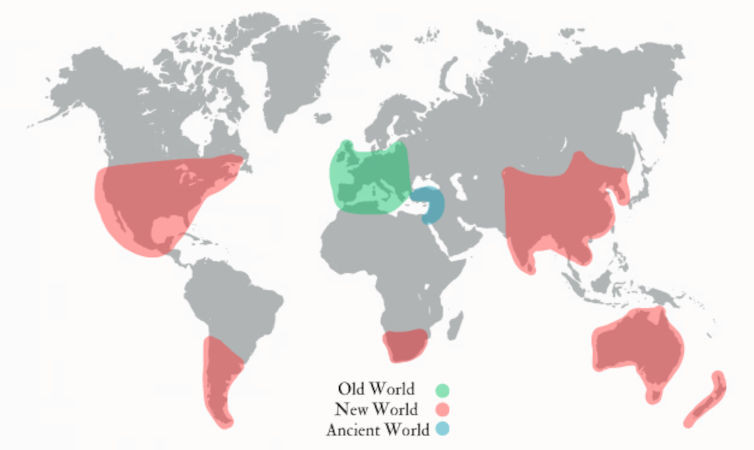Old world wines vs new world wines
Issue: Apr 2023

When embarking on your journey into the world of wine, it often feels like learning a second language. All sorts of terms are unfamiliar to those who have just begun their interest in wine. ‘Old world’ and ‘new world’ are such phrases, but what do they mean and what is their significance?
While they may conjure up visuals of ancient Greeks in togas pouring wine from clay jugs or brand new, technological methods of making wine, largely these terms refer to a location. Of course, in reality, it’s not quite as simple as that, so we are going to delve into the old and new worlds to decode why these terms are so important.
Regions
Old world wines usually hail from Europe and some parts of the Middle East where modern winemaking techniques were developed. The most well known are France, Italy, Spain, Portugal, and Germany, but there are other countries sometimes considered a part of this category such as Croatia, Lebanon, and the UK. Generally, old world wines are named after the place where the grapes were grown, for example, Rioja, Champagne, and Bordeaux.
As Europe extended its influence worldwide a few centuries ago, new world wines started to emerge. New world wines refer to the relatively recent regions that began to cultivate wine; South American countries such as Chile and Argentina, North America in regions like California, Australia and New Zealand in Australasia, and South Africa in the African continent. Their wines are usually named after the grape (or grape blend) from which they’re made, such as cabernet sauvignon or chardonnay.
Geography
The terroir - or environmental factors like soil, climate, and sunlight - in which the grape is grown has one of the most significant influences on the end product; the same grapes grown in different terroirs will produce distinct flavour profiles that are induced by the conditions around them. Old world wines are mostly made from grapes grown in cooler climes, whereas new world wines tend to be from balmier countries where the grapes ripen more.
Flavour
While there is no hard and fast rule, broadly speaking old world wines are lighter with less alcohol content but have more acidity and minerality. In contrast, the additional ripening of new world grapes leads to more sugar, and this in turn gives a robust, fruitier flavour with low acidity and higher alcohol content.
Technology
The old world is where wine as we know it originated, prior to this it was mainly a means of staying hydrated when water was not sanitary enough to drink. Old world vintners - or winemakers - developed regulations to protect the integrity of their wine, including harvest methods, which regions wine can be made in, and minimum alcohol content, and for the most part, these are honoured even today. Meanwhile, the new world plays with technology and experiments with new methods to create its wines because they are not bound by the same rules as the old world.
Ancient world
Wine creation has been traced back as far as 6,000 BC to the South Caucus in Georgia, where they discovered that they could make wine by burying grapes underground during winter, although there seems to be evidence of it going back even further to 8,000 BC. Other ancient world wines are from Iran, Levant (historic areas of Lebanon, Jordan, Palestine, and Syria) and even North Africa (Morocco, Tunisia, and Algeria). Some of these regions, such as Georgia, have continued their winemaking traditions and their wines are available to purchase through vineyards and distributors - in recent times they have become quite trendy for ‘those in the know’.
At Winebanc, we’re here to support your first steps into the journey of wine collection, as well as experts and professionals. Wherever you may be on your journey, contact Winebanc to see how we can help. Winebanc has private, exclusive, and elegant wine cellars in various sizes, with 24/7 customer access across 3 locations conveniently located in the heart of Singapore. Visit us at www.winebanc.wine or contact us at 6955 9788 for more information!